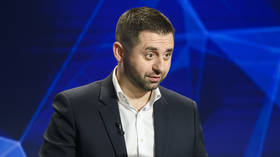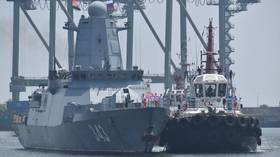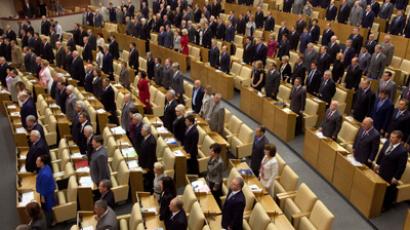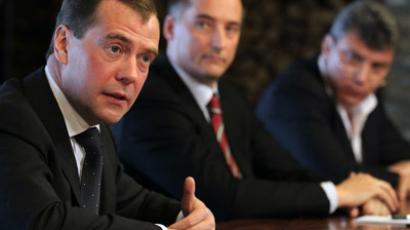Medvedev leaves behind legacy of reform
Dmitry Medvedev’s time in the Kremlin may go down in the history books as a period when Russia began to make serious strides in the fight against corruption, and changes in law that introduced colorful diversity into the nation's political life.
Although Medvedev is widely recognized for declaring war on Russian corruption, his first task as president brought him face-to-face with a conflict of the bloody sort.Just three months into Medvedev’s presidency, on the morning of August 8, 2008, Russia awoke to the news that Georgia had launched a large-scale military offensive against South Ossetia in a desperate bid to claim the territory. The attack caused casualties among civilians and Russian peacekeepers stationed in the capital, Tskhinval.What followed next were five days of intense fighting, with Russian forces pushing deep into Georgian territory. Eventually, Georgian President Mikhail Saakashvili agreed to a ceasefire, which Moscow signed on August 16. Ten days later, Medvedev signed a decree officially recognizing the sovereignty of South Ossetia and nearby Abkhazia.Although Russia was viciously attacked on the Western media front during the duration of the conflict, an EU independent commission report found that Georgia, not Russia, was really to blame for starting the hostilities.
Pushing the reset buttonAlthough the South Ossetian conflict placed severe strains on Russia-US relations, outgoing President Medvedev and his American counterpart, Barack Obama, nevertheless found the political will to activate the button on their “reset” plans.In March 2009, US Secretary of State Hillary Clinton presented Russian Foreign Minister Sergey Lavrov with a mock-up "reset button" to symbolize improved bilateral relations. The little red button, however, quickly became the butt of jokes as the word "reset" was mistranslated into the Russian for “overcharge”. Ironically, however, “overcharged” has come to more accurately describe the state of Russia-US relations in light of recent developments. But more on that later.In April 2010, the reset bore its first fruit in the form of a New START treaty, which limited each side to 1,500 nuclear warheads. The only thing that could possibly derail the bilateral bonhomie was if the United States and Russia failed to cooperate on the construction of the US missile defense system in Eastern Europe. Unfortunately, that is exactly the course the reset is taking today.
Missile defense crash and burnLooking back on the New START treaty, it may seem almost sinister that the Obama administration spoke of slashing nuclear warheads at the very same time it was building a missile defense system in Eastern Europe. Trading away some nuclear missiles while constructing a massive shield to hide under did not fool anybody, least of all the Medvedev administration.As Russian military experts recently warned, the US-built system has the potential for making Russia’s remaining stockpile totally irrelevant. Unless the talks produce some tangible results, Russia will be forced to walk away from New START, possibly prompting another arms race in the process.There is even the possibility that Russia will consider the risk of initiating a preemptive strike on the missile defense system. Russian General Chief of Staff Nikolay Makarov announced last week at a missile defense conference in Moscow that Russia may be forced into such a position if the situation continues to deteriorate.“Considering the destabilizing nature of the (American) ABM system, namely the creation of the illusion of inflicting a disarming (nuclear) strike with impunity, a decision on preemptive deployment of assault weapons could be taken when the situation becomes more difficult,” Makarov said.Meanwhile, Medvedev warned the US and NATO on many occasions over the course of his last two years in office that without an agreement on missile defense, the world would face the prospect of another arms race."I am not satisfied with the American side's reaction to my proposals and with NATO's reaction in general,” the Russian leader told reporters at the G-8 Summit in Deauville, France last year. “Why? Because we are wasting time. Even though I spoke about the year 2020 yesterday as a deadline…which is the year when the construction of a four-stage system of the so-called adaptive approach ends."
Political reformIn an effort to inject more political diversity into Russia’s political system, as well as appease the demands from a chorus of critics, Medvedev signed into law a bill to simplify Russia's current stringent requirements for the registration of political parties."The Justice Ministry should not be seen as a barrier – as participants in a previous discussion called it – but as a filter to do away with irregularities," Medvedev said during a meeting with some 40 leaders of unregistered parties in Moscow.The ministry has in the past refused to register opposition parties, often on technicalities that the political opposition believes unfairly denies them a political voice.The bill, which was passed both houses of parliament, reduces the membership requirement for registering a party to 500 people from the present 45,000. It also eliminates the requirement for parties to collect voter signatures in order to participate in elections.The outgoing President also signed a much-anticipated law on the direct election of governors.“This law now enters into force and from now on heads of regions in this country will be elected by direct secret voting of all citizens living on the territory of the region,” Medvedev announced during a meeting with leaders of the State Duma parties.Finally, in what could also be described as political reform, Medvedev passed a decree for the creation of a Public Television channel in Russia, which is scheduled to air on January 1, 2013.“Of course, the state has influence on everything, but such influence must not be exorbitant,” Medvedev observed.
Battling corruption"Corruption has become a systemic problem, and we therefore need a systemic response to deal with it," – Dmitry Medvedev, May 19, 2008.Although external factors may eventually undo Medvedev’s reset efforts with the United States, nothing will be able to take away his sweeping efforts to eliminate corruption in Russia.One of Medvedev’s first acts as president was the signing of a law obliging officials, including the prime minister, deputy prime ministers and ministers, to report not only their own incomes, but also those of their family members. Medvedev did not exclude himself and his family from following the new legislation.Medvedev continued his battle against corruption up till the very end of his presidential term. In March, he submitted to the State Duma a bill that aims to control civil servants’ expenditures, telling the parliamentary majority he wanted it discussed and approved as soon as possible.“I am asking you to pay special attention to this bill so that it is worked through and made effective before being approved,” the outgoing President told lawmakers.Medvedev’s new draft law obliges all civil servants to declare not only their incomes, but also large expenditures. It requires that state officials report the expenditures of their spouses and children if the expenditures involved acquisitions of land, vehicles or securities. Finally, the bill would require that all documents pertaining to the acquisitions were received legally.Although Russia still has a long way to go before corruption is a thing of the past and the country conforms to the “rule of law.” Nevertheless, Medvedev’s strenuous efforts have put the country on the right path.
Modernization and reformIn addition to fighting corruption, Dmitry Medvedev has shown himself to be a tech-savvy politician. He embraced the endless capabilities of the internet, reaching out to his constituents via a variety of social media, which includes a personal blog and Twitter account. He even instituted a program that allowed him to watch in real-time how government bureaucrats were carrying out their orders.“I want it installed on my own computer, so that I can see at the click of a button, what is happening with the decree, who is responsible for the delay, and what should be done with the culprit,” he told reporters in October, 2010.Meanwhile, reform initiatives are not relegated to the halls of government.The urgent need for police reform was accentuated the January 24, 2011 bombing at Domodedovo International Airport, which killed 36 people and injured 193. The Russian leader slammed public safety issues at a “whole host of facilities” to make his case for broadening police powers “to ensure public safety.”
Military modernizerFinally, Medvedev paved the way for radically streamlining the Russian military. Russia boasts the fourth-largest military in the world, with just over 1 million active personnel and 20 million reserve troops.Following Medvedev’s orders, Makarov said the Russian military will eventually adopt a recruiting structure similar to those of NATO member states, slowly phasing out its conscript-based system in favor of recruiting contract troops."We will be moving further, towards a contract armed forces,” the General Chief of Staff said.In conclusion, Medvedev’s one-term presidency, focused as it was on reform and modernization, provided a perfect balancing act to Putin’s emphasis on security and stability. Now, Putin will pick up where Medvedev left off, hopefully restoring the reset with the United States, as well as forging an agreement with the US and NATO over European missile defense.In the absence of such crucial agreements, Russia will be forced to shift gears and look for new allies, predictably in the East. The United States and Europe now have an opportunity to meet Russia halfway in order to confront dire global problems, including terrorism and economic stagnation to name a few. It would be terribly unfortunate if this opportunity was missed at such a crucial juncture in history.Robert Bridge, RT














